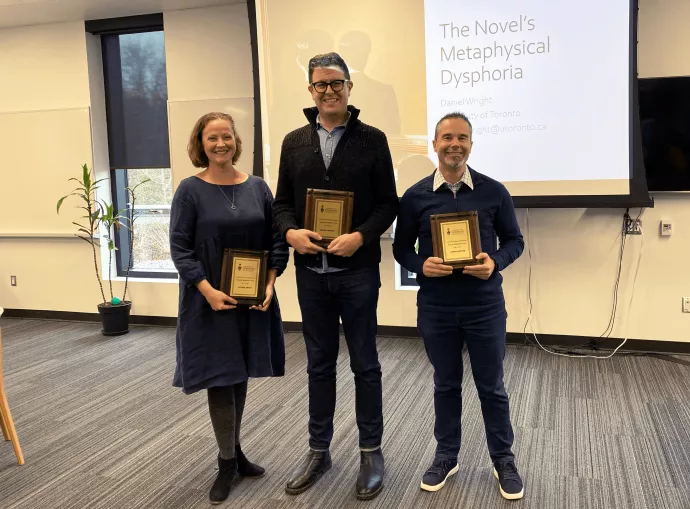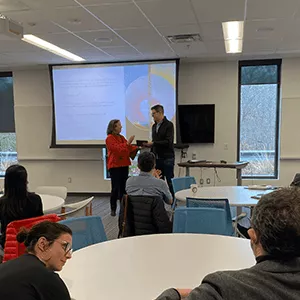Symposium Celebrates 2022 Research Prize Recipients

For the first time in recent years, the Annual Research Prize Symposium was held on campus; attendees gathered Tuesday afternoon in the Collaborative Digital Research Space (CDRS) to celebrate the contributions of early career researchers and scholars in the Humanities, Sciences and Social Sciences.
The awards were established in 2016 by the Office of the Vice-Principal, Research (OVPR). This year’s symposium was MC'ed by Josh Milstein, Associate Vice-Principal, Research - Facilities and associate professor in the Department of Chemical & Physical Sciences; and Elspeth Brown, Associate Vice-Principal, Research and professor in the Department of Historical Studies.
The event recognized Psychology professor Loren Martin, who was awarded the 2022 prize in the Sciences for his work on understanding pain processing and modification; Social Sciences award recipient Professor Alison Smith from the Department of Political Science for her contributions to the study of Canadian politics, welfare state, social protection, homelessness, poverty, and inequality; and Professor Daniel Wright from the Department of English & Drama who was awarded the Research Prize in the Humanities for his work on the study of Victorian novels, gender and sexuality, and the intersections between literature and philosophy.
“I was particularly struck by how, in each research discovery journey, the research and the teaching mission are intertwined,” remarked Brown, who noticed the common thread running through the talks. "It was wonderful to hear about the exciting work taking place across UTM."
Recipients presented a brief overview of their work, sharing aspects of their research and fielding questions from the audience.

"Receiving this award means that I have an obligation to continue to learn and grow academically and professionally. It’s a commitment to giving back what has been given to me so generously in hours of mentoring and support.”
Loren Martin, Associate Professor, Psychology

Professor Martin was first to deliver his talk, explaining how his lab is working to understand how context — such as objects in our environment, where we are located, who we are with, and even psychological trauma — can be associated with pain.
To put it simply: anything that increases threat, increases pain perception.
“To me there is no more difficult research ‘nut to crack’ than understanding pain processing and modification,” explained Martin. “Pain is sensation like no other because at face value it requires biological systems, but the perception and experience of pain is changed by our thinking, expectation, mood, social history, and life experience.”
“In part this is what makes treating chronic pain so difficult. We target biological systems with little regard for the psychology and lived experience of the patient.”
“I am so grateful to my department, colleagues, and students for their support and their appreciation of my work. I am excited to continue to collaborate with the incredible students and faculty at U of T in this effort to better understand the housing crisis and solutions to it.”
Alison Smith, Assistant Professor, Political Science

Professor Smith followed, sharing her work on affordable housing. She’s seeking answers to why, in a country as rich and as cold as Canada, so many people are without housing.
“The housing crisis in Canada is getting a lot of attention these days, which is important because more and more people are unable to find affordable and adequate homes,” said Smith. “But there has been a virtually non-stop housing crisis for people with low incomes in Canada. The most severe manifestation of this crisis is homelessness.”
Who is responsible for homelessness, she asks, both in terms of the causes and the remedies?
“My research seeks to better understand the failure of the Canadian welfare state to provide social protection — which often means safe, affordable and supportive housing — to people who are or are at risk of being unhoused.”
Smith noted that the different ways that homelessness can be defined can be an obstacle to the development of inclusive and responsive policy. “But this can also be a strength if differences are embraced,” she said.
“This award is especially exciting recognition because it offers the rare opportunity for me as a humanities scholar to be recognized alongside my colleagues in the sciences and the social sciences. I’m delighted to be part of this snapshot of the diversity of research happening at UTM and the range of problem we’re all trying to solve.”
Daniel Wright, Associate Professor, English & Drama

Professor Wright was the third speaker of the afternoon, introducing attendees to The Grounds of the Novel, his forthcoming book in which he argues that the novel form uses metaphors of ground, grounding, underground, and groundwork to not only imagine and articulate fictional being, but to distinguish it from actual being.
Wright is interested in the intersections between literature and philosophy and — in this book —the history of the novel and the history of metaphysics.
“My aim is always to figure out how novels, especially realist novels, work: how do fictional plots and characters help us to work out the big issues of human experience?” he explained. “How do novels do the extraordinary, magical work of making us feel immersed and at home and grounded in fictional worlds?”
“I’m especially interested in working through these kinds of questions in relation to sexuality and gender, and the intersections between the history of the novel and the history of philosophy.”
As Brown pointed out, though the projects were diverse, the relationship between research and teaching was present in the experience of each professor — whether during their time as students or as faculty members today.
Martin made clear that the work of his students is central to his projects, using his presentation to amplify their research and tying it into the work of the lab overall. Smith shared that her focus changed when, as a master's student at the University of British Columbia (UBC), her Global Politics professor took her class on a tour of Vancouver's Downtown Eastside. For Wright, it was a discussion with his students about a contemporary novel that took his own project in a new and exciting direction.
A reception followed the presentations; attendees enjoyed refreshments, chatted with friends and colleagues, and offered warm congratulations to the recipients. We were so pleased to see everyone gather to celebrate their achievements — and look forward to seeing UTM's research community at our next event.
Do you know of an outstanding early career researcher? The next call for nominations will take place in spring of 2023. Learn more about the UTM Annual Research Prizes.
Mark your calendars! Join us January 26 at 1:00PM for the 2022 Desmond Morton Annual Research Excellence Lecture — a virtual event celebrating award recipients Professor Yuhong He from Geography, Geomatics and Environment, and Professor Claudiu Gradinaru from Chemical and Physical Sciences. Registration will open soon.



